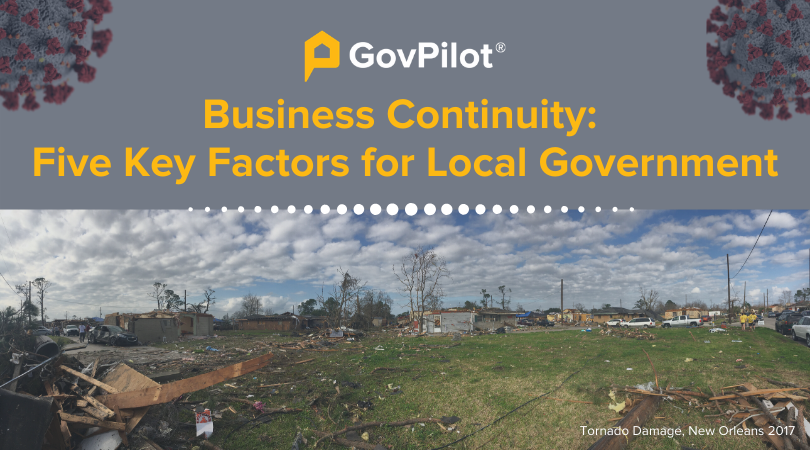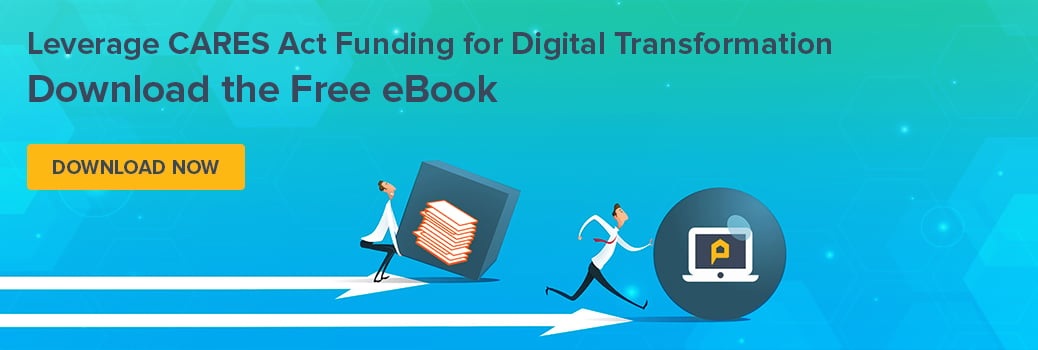According to the Federal Emergency Management Agency, 40% of small businesses that suspend business operations for just one day after a disaster, never reopen.
It's a sobering statistic unfortunately being amplified during these difficult times.
But for governments, failure is not an option. So how can local governments maintain essential functions and even non-essential services during major disruptions while ensuring the safety of their employees and residents?
What can be learned by enabling local governments to come out stronger on the other side?
In the past, local governments have dusted off their business continuity plans in the wake of natural disasters like floods, fires, tornados, hurricanes, and earthquakes.
Now, as COVID-19 threatens global health and economic activity, local governments across the country are working to ensure the continuity of operations and essential services for residents while enabling remote work capabilities for their employees. This is certainly a challenge - but it is not limited to this global pandemic.
Whether providing constituents the ability to file a building permit, report a concern, or apply for an emergency business loan, local governments must be accessible and responsive during an emergency.
Business continuity planning, risk management and transitioning information technology operations to the cloud, create much needed resilience for local governments and state agencies to better handle these occurrences.
Whether a disruption is caused by a pandemic, a natural disaster, or a cyberattack - all of which experts agree are increasing in frequency and severity - governments that have unified, cloud-based systems in place will be more resilient and better positioned to serve their constituents when disaster strikes, and will operate with optimal efficiency when the skies are blue.
Here are five key factors to consider that will make your local government more resilient:
1. Unify operations & departmental data
In a crisis, communication and information flow is critical. Even under normal operating circumstances, data and communications silos inhibit information sharing, analysis, and decision making. Add to the equation a crisis which necessitates that employees work remotely (if they can), and informed decision making and operations can be severely impacted.
By unifying operations and data on one unified, cloud-based platform, local governments can enable employees to work from home and share critical information across departments that ultimately keep operations running smoothly.
2. Secure data from cyber and physical threats
When run through an on-site server or data center, government operations are made vulnerable to disruption. With far less security then a professionally hosted cloud server (1&1, AWS, Azure)
or ability to enable employees to log in remotely in an emergency, the business continuity of local governments that rely on an on-site server can be crippled by a cyberattack or a disaster like a fire or flood. Say nothing of paper files and records stored on site that might be destroyed in such a disaster.
From September 2017 - August 2019, there were more than 6,800 cyberattacks against State and Local governments, mainly through on-site IT systems, according to GovTech Magazine. That number is only increasing.
From 2007 - 2013, 80% of Americans - 243 million people - lived in counties that experienced at least one weather related disaster. Even if City Hall is spared by a natural disaster, if employees are unable to get to their office, they won’t be able to deliver critical services. The ability to work and provide services remotely is key to business continuity.
3. Access information 24/7 from anywhere in real-time
Whether a global pandemic that requires social distancing, a sick child home from school that needs care, or a blizzard or a flood that closes roads - government operations should not have to depend on the ability of public employees to get to their desk.
Effective Modern Government Management depends on the ability for employees and elected officials to access information in real-time from any location, at any time. The private sector has adopted and reaped the benefits of cloud-based solutions. Local governments should do the same.
4. Drastically improve efficiency through automated processes
Efficiency is the driver of success for any organization. For local governments it drives constituent satisfaction, and increased productivity, cost savings, and revenue at City Hall.
Employees in the Code Enforcement Office from GovPilot customer, Elizabeth, New Jersey were able to save an average of two hours per day thanks to automated, digitized processes. That’s two extra hours back in their day to take on other tasks and issues on behalf of their community.
In Union Township, New Jersey - another GovPilot customer - the department responsible for handling Open Records Requests (FOIA/OPRA) transitioned from paper requests to digitized forms, and realized a 91% decrease in improperly or illegibly filled forms. This enabled the town to shift an employee to support another department, rather than having to make an outside hire.
5. Reduce the need for people to call or visit City Hall
We live in an on-demand, digital world. Residents expect convenience. We shop online, we bank online, we book travel online. Constituents should be able to interact with their government online. Digitized forms and processes delivered through a unified cloud-based platform and made available through a local government’s website, can drastically reduce time consuming, inconvenient, and in today’s world - dangerous - in-person interactions.
On average, GovPilot’s customers see a 75% - 90% decrease in call volume and walk-ins as residents access the information and forms they need online. This frees up significant time for employees to be productive in other aspects of their jobs, creating value for the government and public they serve.
In Conclusion:
In a world of “Social Distancing” and increased disruptions, the efficiency, productivity, security, and convenience provided by cloud-based government management platforms are key to business continuity and the delivery of essential services.
If you are interested in learning more about how GovPilot can help your local government maximize efficiency and resiliency, please schedule a 15-minute consultation.
With hurricane season beginning on June 1st and extending through November 30th, now is an excellent time for local governments to review their business continuity arrangements as well as their disaster recovery plans.
We look forward to speaking with you soon.









